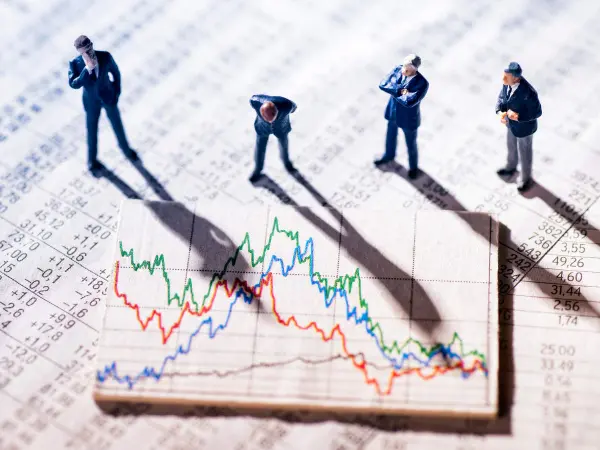trending
neon
Cirque du Soleil offers summer ticket deals
dining out
Celebs ditch the Strip for iconic Henderson restaurant
july 
trending
neon
Cirque du Soleil offers summer ticket deals
dining out
Celebs ditch the Strip for iconic Henderson restaurant
july 

Stock market volatility has far-reaching effects on economic stability. This article explores the causes of stock market fluctuations and their impact on growth, investment, and consumer confidence




Stock market volatility is a significant factor in determining the overall health of the economy. Sudden market fluctuations can cause ripple effects across sectors, influencing everything from individual savings to corporate investment strategies. Understanding the causes and consequences of stock market volatility is essential for both investors and policymakers alike.
What Causes Stock Market Volatility?
Several factors contribute to stock market volatility, including:
Economic Data and Indicators Economic reports, such as unemployment rates, inflation figures, and GDP growth, play a major role in market fluctuations. Positive data often leads to market rallies, while disappointing figures can prompt sell-offs.
Interest Rates Central bank policies regarding interest rates significantly impact the stock market. When the Federal Reserve raises interest rates to control inflation, borrowing costs increase, which can lead to lower corporate earnings and, in turn, a drop in stock prices.
Political Events and Global Instability Elections, geopolitical tensions, and global crises (such as pandemics or wars) can create uncertainty, leading to heightened volatility in financial markets.
Corporate Earnings Reports Earnings reports from major companies can cause significant stock price swings, especially when the results deviate from analysts' expectations.
Speculation and Market Sentiment Investor behavior can contribute to volatility, especially when emotions like fear or greed take over. Speculative bubbles, such as those seen in the dot-com era or the housing market prior to the 2008 financial crisis, demonstrate how herd behavior can destabilize markets.
Impact on Economic Growth and Stability
Investment Decisions When markets are volatile, both individual and institutional investors may become more cautious. Investors may delay or reduce their investments in stocks, potentially resulting in lower overall capital for businesses, which could hinder economic growth. Conversely, periods of stable market growth encourage increased investment, fostering innovation and expansion.
Consumer Confidence Stock market fluctuations have a direct effect on consumer confidence. A significant drop in stock prices can create anxiety about personal wealth, leading to reduced consumer spending. On the other hand, sustained market gains can boost confidence and spending, stimulating demand for goods and services.
Corporate Investment Strategies Volatility can affect corporate decisions regarding expansion, hiring, and spending. Companies might hold off on investing in new projects or hiring new employees during periods of heightened uncertainty, affecting the job market and overall economic activity.
Retirement Savings Many Americans rely on the stock market for retirement savings through 401(k) plans and individual retirement accounts (IRAs). Fluctuations in the market can have a significant impact on the value of these savings. A sharp downturn may delay retirement plans or force individuals to alter their lifestyle expectations.
Banking and Credit Markets Stock market instability can also influence the banking sector. If stock prices plummet significantly, financial institutions may experience liquidity issues. This can make borrowing more expensive, further tightening the availability of credit for consumers and businesses, ultimately slowing down economic growth.
Market Volatility and Long-Term Stability
While short-term volatility can cause disruptions in the economy, long-term stability often prevails. The key lies in market resilience—how quickly the market bounces back after periods of stress. Historically, the stock market has shown the ability to recover from downturns, although recovery periods can vary significantly based on the severity of the shock.
Role of Federal Reserve and Central Banks Central banks play a crucial role in maintaining long-term stability by using monetary policy tools to manage inflation and smooth out volatility. By adjusting interest rates and implementing quantitative easing (QE) programs, central banks can help buffer the economy from extreme volatility.
Diversification and Risk Management For individual investors, diversifying investments across different asset classes and sectors can help mitigate the risks of stock market volatility. Maintaining a balanced portfolio can cushion against market swings and provide more stability to individual wealth.
Global Investment Diversification Global diversification allows investors to hedge against domestic market volatility by investing in international assets. A well-diversified global portfolio is less susceptible to regional financial disruptions and can help stabilize long-term returns.
Mitigating the Impact of Volatility
Policy Interventions Policymakers can intervene in times of severe market instability to prevent broader economic collapse. For instance, the U.S. government’s intervention during the 2008 financial crisis—through initiatives like the Troubled Asset Relief Program (TARP)—helped stabilize the banking system and prevent further economic decline.
Market Regulation and Oversight Strong market regulations and oversight help to ensure transparency and fairness in financial markets. By curbing speculative excesses and reducing fraud, regulators can help mitigate the risk of market bubbles and crashes.
Long-Term Perspective Investors with a long-term perspective often find success in weathering market volatility. Short-term market fluctuations may be unsettling, but consistent investment in well-established assets, such as blue-chip stocks or diversified mutual funds, can yield long-term benefits
Stock market volatility has far-reaching effects on economic stability. This article explores the causes of stock market fluctuations and their impact on growth, investment, and consumer confidence
the latest

Job Cuts at Lincolnshire Refinery, UK Growth Revised Upward
Around 125 jobs will be lost at the Lincolnshire (Lindsey) oil refinery after its parent company entered insolvency, even as revised GDP data shows the UK economy grew faster under Labour than previously estimated

Reeves Proposes Youth Mobility Deal for UK and EU Under-30s
UK Chancellor Rachel Reeves has proposed a new youth mobility scheme that would allow young Europeans aged ~18-30 to live and work in the UK under a post-Brexit arrangement, while emphasising limits on duration and net migration.

Biden Approves Ukraine Use of Long-Range Missiles Into Russia
President Biden has authorized Ukraine to use long-range missiles to target locations inside Russia, marking a significant escalation in the ongoing conflict.

Labour Byelection Win Marks SNP Decline, Says Anas Sarwar
Scottish Labour leader Anas Sarwar said the party’s byelection victory shows the SNP’s dominance is fading, signaling a major shift in Scottish politics.

UAE Employees: Are Salaries Deductible During Annual Leave?
A common question in the UAE workplace is whether employers can deduct salaries while employees are on annual leave. Experts explain labor law provisions and best practices.

Sharjah Self-Defense Club Claims No-Gi Title at UAE Jiu-Jitsu
Sharjah Self-Defense Club emerged victorious in the No-Gi category at the UAE Jiu-Jitsu Championship, showcasing skill, discipline, and teamwork.

UAE Schools Announce One-Month Winter Break
UAE schools will have a one-month winter break from December 8, 2025, to January 4, 2026, giving students and staff an extended holiday period.

Sharjah Extradites Uzbek and Nepalese Nationals for Fraud
Sharjah authorities have extradited two foreign nationals—one Uzbek and one Nepalese—wanted under Interpol Red Notices to face fraud charges.

US Envoy Confident of Breakthrough on Gaza Crisis
A senior US envoy expressed optimism about achieving a breakthrough in Gaza peace talks, signaling renewed international efforts to end the humanitarian crisis.